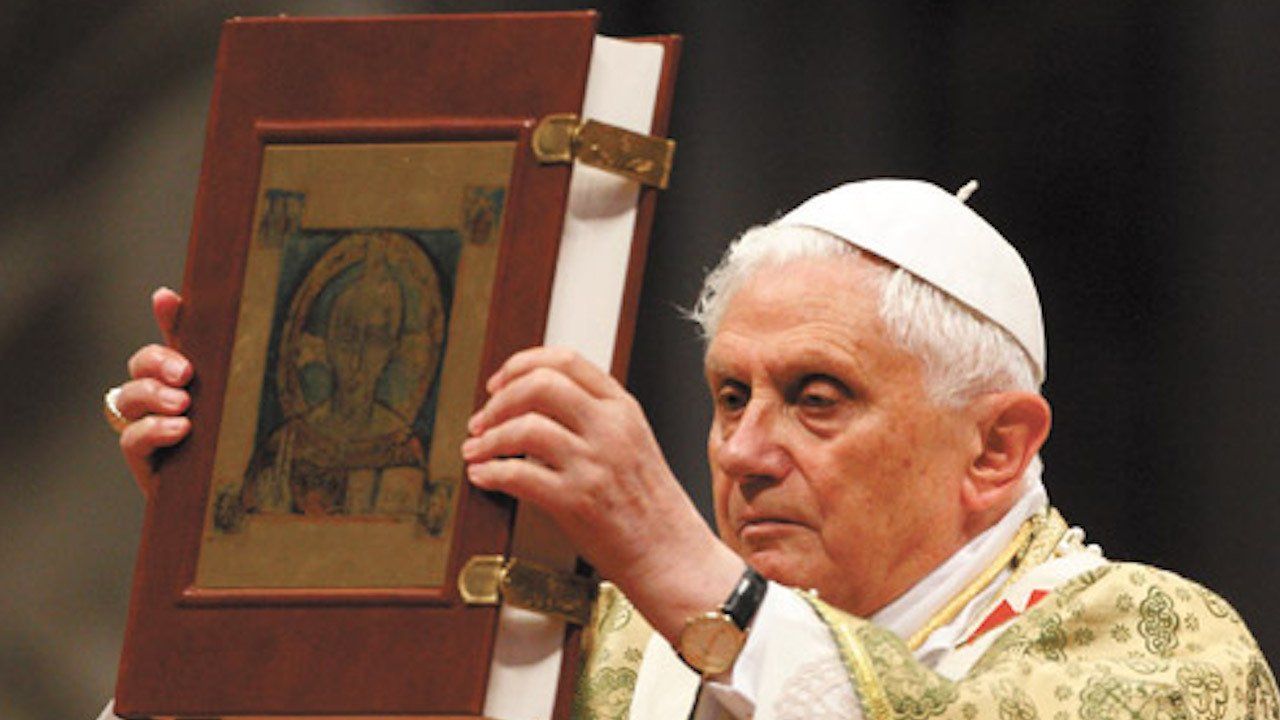Optimism as Ideology vs. Hope as Gift
by Pope Benedict XVI
Feast of the Meeting of the Meeting of Our Lord and Savior Jesus Christ in the Temple
Anno Domini 2021, February 2

We must pay attention to the different ways in which optimism and hope act in order to get the nature of each in view. The goal of optimism is the utopia of the finally and everlastingly liberated and fortunate world, the perfect society in which history reaches its goal and reveals its divinity. The immediate aim which as it were guarantees the reliability of the ultimate goal, is the success of our ability to do things. The goal of Christian hope is the kingdom of God, that is the union of world and man with God through an act of divine power and love. The immediate aim that shows us the way and confirms the rightness of the ultimate goal is the perpetual presence of this love and this power that accompanies us in what we do and takes us up at the point where the potential of our own ability to act comes to an end. The internal justification for optimism is the logic of history, which goes its own way and presses forward irrevocably towards its goal: the justification of Christian hope is the incarnation of God’s word and love in Jesus Christ.
If we now try to express what has been said in a more philosophical and theological terminology in something approaching the speech and thought of our everyday life, we can say that the goal of the ideologies is finally and ultimately success, in which we are able to realize our own wishes and plans. Our own ability and activity on which we are betting is however aware that ultimately it is guided and confirmed by an irrational fundamental tendency of development; the dynamic of progress means that everything ultimately becomes all right, as I was told recently by a physicist who regarded himself as important when I had the temerity to utter doubts about some modern techniques for handling nascent human life. The aim of Christian hope, by contrast, is a gift, the gift of love, which is given us beyond all our activity: to vouch for the fact that this thing that we cannot control or compel and that is yet the most important thing of all for human beings does exist, and that we are not clutching at thin air in waiting insatiably for it, we have the interventions of God’s love in history, most powerfully in the figure of Jesus Christ in whom God’s love encounters us in person.
But this means that the product of the promise of optimism is something that we must ultimately produce ourselves, trusting that the blind process of development in connection with our own activity will finally lead to the right goal. The gift of the promise of hope, on the other hand, is precisely that, a gift that as something already bestowed we await from him who alone can really give; the God who in the midst of history has already begun His age through Jesus. This in turn means that in the first case there is in reality nothing to hope for, because what we are awaiting we must bring about ourselves, and nothing will be given us beyond what we can achieve ourselves. But in the second case real hope does exist beyond all our potential and possibilities, hope in the unbounded love that at the same time is unbounded power.
In reality ideological optimism is merely the façade of a world without hope that is trying to hide from its own despair with this deceptive sham. This is the only explanation for the immoderate and irrational anxiety, this traumatic and violent fear that breaks out when some set-back or accident in technological or economic development casts doubt on the dogma of progress. The delight in horrors, the violent gestures of a mutually encouraged fear that we experienced after Chernobyl had something irrational and eerie about it, to the extent that it can only be understood if something much more profound lies behind it than an accident that, however serious, was nevertheless limited. The violence that marks these outbreaks of anxiety and fear is a kind of self-defense against the doubts that threaten belief in the ideal world of the future, since human beings are by their nature directed toward the future. We cannot live if this fundamental element of our being becomes void.
This is where the problem of death crops up. Ideological optimism is an attempt to have death forgotten by continually talking about history striding forward to the perfect society. The fact that this is to skirt round what is really important and that people are being soothed with a lie becomes obvious whenever death itself moves into the vicinity. The hope of faith, on the other hand, reveals to us the true future beyond death, and it is only in this way that the real instances of progress that do exist become a future for. us, for me, for every individual.
*From Pope Benedict XVI, The Yes of Jesus Christ: Exercises in Faith, Hope, and Love, translated by Robert Nowell (New York: Crossroad Publishing Company, 1991), 46-49.
Contribute to Cultural Renewal by Sharing on Your Preferred Platform
In an isolating secularized culture where the Church's voice is muffled through her many divisions, Christians need all the help they can get to strengthen their faith in God and love toward their neighbor. Eighth Day Institute offers hope to all Christians through our adherence to the Nicene faith, our ecumenical dialogues of love and truth, and our many events and publications to strengthen faith, grow in wisdom, and foster Christian friendships of love. Will you join us in our efforts to renew soul & city? Donate today and join the community of Eighth Day Members who are working together to renew culture through faith & learning.









